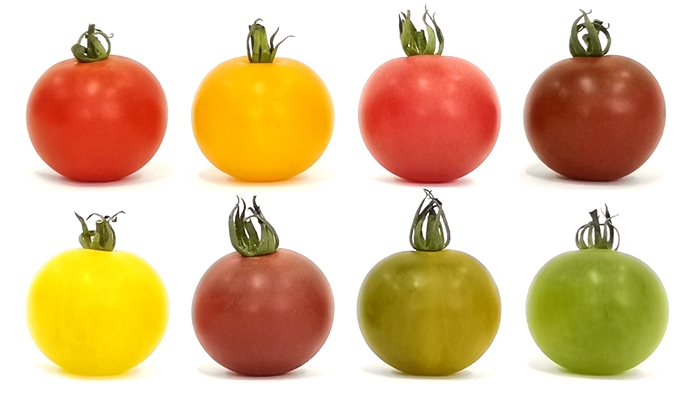Research group led by Professor LI Chuanyou from Institute of Genetics and Developmental Biology, Chinese Academy of Sciences (IGDB-CAS) developed a rapid breeding strategy to generate tomato lines with different colored fruits from red-fruited materials by CRISPR/Cas9-mediated multiplex gene editing.
Using this strategy, the red-fruited cultivar Alisa Craig has been engineered to a series of tomato genotypes with different fruit colors, including yellow, brown, pink, light-yellow, pink-brown, yellow-green, and light-green.
Multiplex gene editing rapidly customizes tomato cultivars with different fruit colors. (Image by IGDB)
Tomato is the world's most popular fruit/ vegetable and fruit color is considering a vital trait in horticultural crops which markedly affects customer preferences. The fruit color is determined by the accumulation of different pigments such as carotenoids and flavonoids etc. It is a multigenic trait which takes years to introgress all color-related genes in a single genetic background using traditional cross-breeding, and to avoid linkage drag during this process is also difficult.
Using their developed approach, transgene-free plants with different fruit colors can be obtained in less than one year and the most positive point is it can retain the qualities of original cultivar and does not affect other important agronomic traits.
This strategy provides a reference for improving multigene-controlled traits by multiplex gene editing and can be easily extended to other horticultural crops.
This work entitled “Recoloring tomato fruit by CRISPR/Cas9-mediated multiplex gene editing” and was published in Horticulture Research on September 19, 2022 (DOI: 10.1093/hr/uhac214). Dr. YANG Tinaxia, Dr. Muhammad ALI and Dr. LIN Lihao are the first authors. Prof. LI Chuanyou and Dr. DENG Lei are the corresponding authors.
This study was supported by grants from the Ministry of Science and Technology of China, the National Natural Science Foundation of China and the Chinese Academy of Sciences.
Contact:
Prof. LI Chuanyou
Institute of Genetics and Developmental Biology, Chinese Academy of Sciences
 Multiplex gene editing rapidly customizes tomato cultivars with different fruit colors. (Image by IGDB)Tomato is the world's most popular fruit/ vegetable and fruit color is considering a vital trait in horticultural crops which markedly affects customer preferences. The fruit color is determined by the accumulation of different pigments such as carotenoids and flavonoids etc. It is a multigenic trait which takes years to introgress all color-related genes in a single genetic background using traditional cross-breeding, and to avoid linkage drag during this process is also difficult.Using their developed approach, transgene-free plants with different fruit colors can be obtained in less than one year and the most positive point is it can retain the qualities of original cultivar and does not affect other important agronomic traits.This strategy provides a reference for improving multigene-controlled traits by multiplex gene editing and can be easily extended to other horticultural crops.This work entitled “Recoloring tomato fruit by CRISPR/Cas9-mediated multiplex gene editing” and was published in Horticulture Research on September 19, 2022 (DOI: 10.1093/hr/uhac214). Dr. YANG Tinaxia, Dr. Muhammad ALI and Dr. LIN Lihao are the first authors. Prof. LI Chuanyou and Dr. DENG Lei are the corresponding authors.This study was supported by grants from the Ministry of Science and Technology of China, the National Natural Science Foundation of China and the Chinese Academy of Sciences.Contact:Prof. LI ChuanyouInstitute of Genetics and Developmental Biology, Chinese Academy of SciencesEmail: cyli@genetics.ac.cn
Multiplex gene editing rapidly customizes tomato cultivars with different fruit colors. (Image by IGDB)Tomato is the world's most popular fruit/ vegetable and fruit color is considering a vital trait in horticultural crops which markedly affects customer preferences. The fruit color is determined by the accumulation of different pigments such as carotenoids and flavonoids etc. It is a multigenic trait which takes years to introgress all color-related genes in a single genetic background using traditional cross-breeding, and to avoid linkage drag during this process is also difficult.Using their developed approach, transgene-free plants with different fruit colors can be obtained in less than one year and the most positive point is it can retain the qualities of original cultivar and does not affect other important agronomic traits.This strategy provides a reference for improving multigene-controlled traits by multiplex gene editing and can be easily extended to other horticultural crops.This work entitled “Recoloring tomato fruit by CRISPR/Cas9-mediated multiplex gene editing” and was published in Horticulture Research on September 19, 2022 (DOI: 10.1093/hr/uhac214). Dr. YANG Tinaxia, Dr. Muhammad ALI and Dr. LIN Lihao are the first authors. Prof. LI Chuanyou and Dr. DENG Lei are the corresponding authors.This study was supported by grants from the Ministry of Science and Technology of China, the National Natural Science Foundation of China and the Chinese Academy of Sciences.Contact:Prof. LI ChuanyouInstitute of Genetics and Developmental Biology, Chinese Academy of SciencesEmail: cyli@genetics.ac.cn CAS
CAS
 中文
中文




.png)
